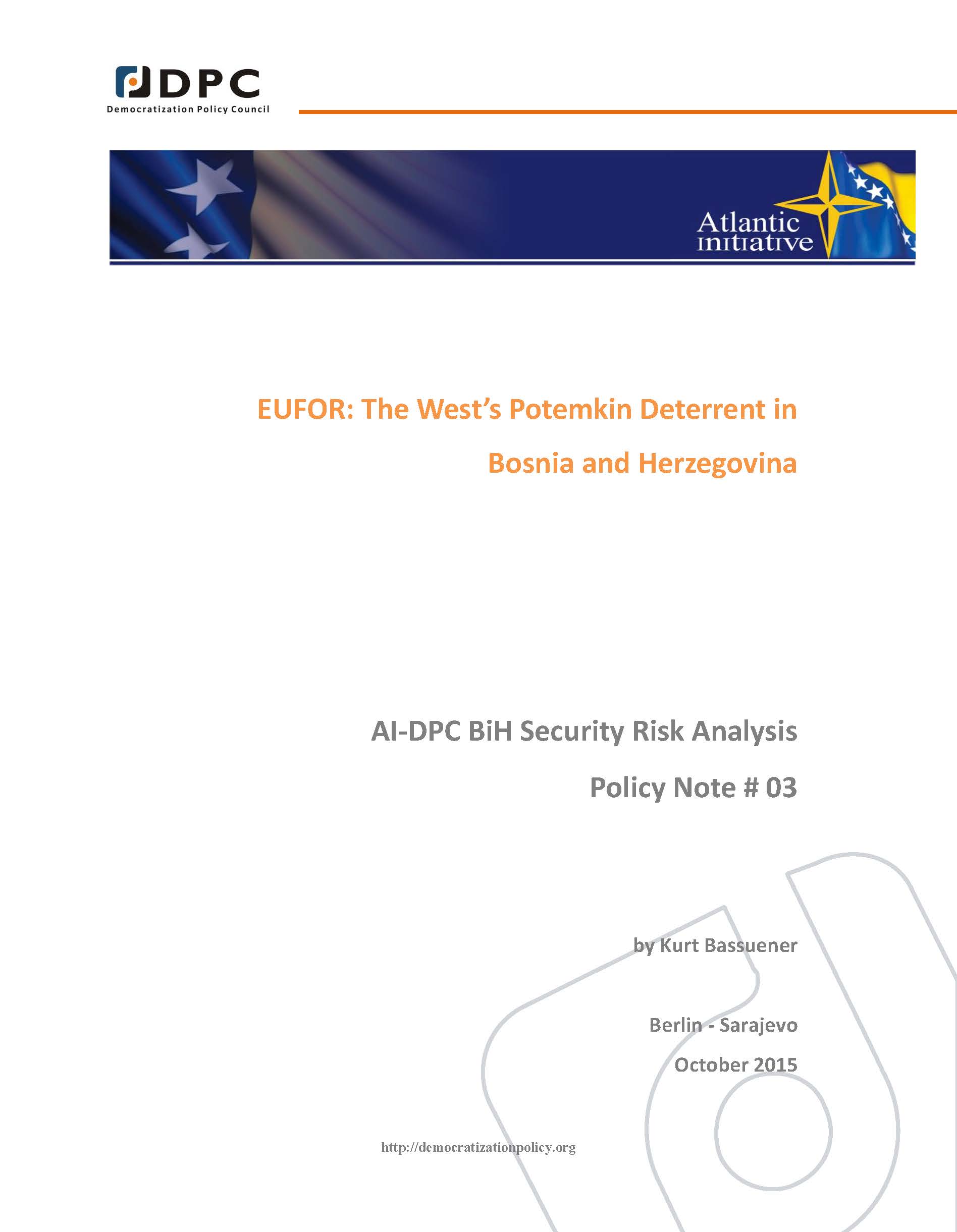AI-DPC BiH SECURITY ANALYSIS POLICY NOTE 03: EUFOR: The West’s Potemkin Deterrent in Bosnia and Herzegovina
AI-DPC BiH SECURITY ANALYSIS POLICY NOTE 03: EUFOR: The West’s Potemkin Deterrent in Bosnia and Herzegovina
Author(s): Kurt Bassuener
Contributor(s): Toby Vogel (Editor)
Subject(s): Security and defense, Military policy, Inter-Ethnic Relations
Published by: DPC Democratization Policy Council e.V.
Keywords: BiH; EUFOR; NATO; West’s Potemkin; security; interethnic conflict; security council; politics; Russia; veto;
Summary/Abstract: The EU’s military deterrent force in Bosnia and Herzegovina (BiH), EUFOR/Operation Althea, is nearing the end of its 11th year of operation. It came into being in 2004 with great fanfare at a time of EU self-confidence and ambition, succeeding NATO in its role of maintaining a “safe and secure environment,” as prescribed by the Dayton Peace Accords. It appeared then to be a mission of guaranteed success. At its current 600 troops, it is now less than one-tenth of its original mandated strength of over 7,000, which itself was about one-sixth of the strength of NATO’s Implementation Force (IFOR) of 54,000 troops. The force has atrophied as the political will to maintain executive instruments has evaporated among most EU member states. Perversely, its decimation in strength correlates with an incremental regression in BiH’s political atmosphere over the last 8 years; citizens feel less secure today than they did in 2006, according to EUFOR’s own polling data. The country is now completely polarized by an upcoming referendum in the Republika Srpska on the legitimacy of the state-level judicial institutions which Western diplomats and numerous local political actors have declared a “fundamental violation” of the Dayton Peace Accords Western military professionals assess EUFOR’s deterrent and reaction capability as effectively nonexistent. Essentially, it is just a placeholder force to provide a foundation for external reinforcement. Were a crisis, such as organized interethnic violence, to erupt, it would require outside forces to respond, let alone contain. Many interviewees for this report dispute EUFOR’s capacity to secure even Sarajevo International Airport. The legal platform for EUFOR, a UN Security Council resolution, is up for annual renewal in early November. Last year, the Republika Srpska called for the mission to end, followed by a Russian diplomatic attack on the mission in the Security Council and an unprecedented abstention. Russia’s veto in July of this year of the UK-sponsored Srebrenica commemoration resolution, in tandem with the overall tension between Russia and the West, most recently reflected in Russia’s deployment to Syria, make a veto of the renewal a strong possibility. The West, with the EU in a leading role, is responsible for the deterrence failure which has led to a dangerously degrading trajectory in BiH. The growing sense of insecurity has not only made durable progress impossible, but is leading to the increasing likelihood – and gravity – of political miscalculation by the BiH political leaders it has empowered. Renewed interethnic violence remains a real possibility. A credible Western deterrent force, be it under the EU or NATO umbrella, is not only essential to prevent disaster in BiH; it is a prerequisite to enabling a popular consensus in the country so that ultimately it no longer requires external guardians to ensure the peace. Now is the time for the West to take action to bolster its deterrent capability in BiH before, not after, events have spiraled out of control. Unless leading Western powers now forge a consensus on planning and action to fulfil the moral and legal obligations they undertook to maintain the peace in BiH, they will likely suffer the consequences of their failure.
Series: DEM. POLICY COUNCIL - Policy Notes
- Page Count: 23
- Publication Year: 2015
- Language: English
- Content File-PDF

